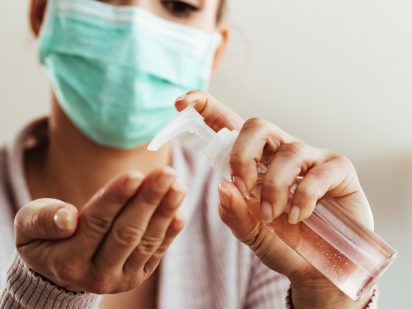While the world is not as distant as it once was, this is still a time to exercise caution and practice safety.
The keys to fighting COVID-19 – that is, mainly prevention to avoid contracting it – have remained steadfast over the past few months.
Masks
The wearing of face masks has been proven to strongly reduce the risk of spreading COVID-19. COVID-19 spreads mainly from person to person through respiratory droplets produced when an infected person coughs, sneezes, talks, or raises their voice, the Centers for Disease Control and Prevention (CDC) states. To reduce the spread of COVID-19, the CDC recommends that people wear masks in public settings when around people outside of their household, especially when other social distancing measures are difficult to maintain.
Social distancing
To avoid being in close contact with people outside of your household, physical distancing (or social distancing, a phrase that will forever be associated with the year 2020, no doubt) is recommended. People should stand six feet apart in both indoor and outdoor spaces.
Social distancing – that six feet apart – is important because when an infected person coughs, sneezes, or talks, droplets from their mouth or nose are launched into the air and can land in the mouths or noses of people nearby … unless they are six feet away.
Hand hygiene
Eighty percent of communicable diseases are transferred by touch, so practicing hand hygiene would understandably be important to help fight disease.
According to the CDC, you should wash your hands often with soap and water for at least 20 seconds, especially after you have been in a public place, or after blowing your nose, coughing, or sneezing. You should also avoid touching “the t-zone” – your eyes, nose, and mouth – with unwashed hands.
The North Dakota Department of Health recommends handwashing:
- before, during, and after preparing food
- before eating food
- before and after caring for someone at home who is sick
- before and after treating a wound
- after using the toilet
- after changing diapers or cleaning up a child who has used the toilet
- after touching an animal, animal feed, or animal waste
- after handling pet food or pet treats
- after touching garbage
Keep an eye on your health
The Centers for Disease Control and Prevention recommend that you stay vigilant of your own health.
- Be alert for symptoms. Watch for fever, cough, shortness of breath, or other symptoms of COVID-19. This is especially important if you are running essential errands, going into the office or workplace, and in settings where it may be difficult to keep a physical distance of six feet.
- If symptoms develop, take your temperature. Do not take your temperature within 30 minutes of exercising or after taking medications that could lower your temperature.
- Follow CDC guidance if symptoms develop.
Come in and get care
In these trying times, Trinity Health continues to offer the services you need today, safely and quickly. For your own well-being, please do not delay preventive care or treatment for health conditions. Our safe environment includes mandatory masking, social distancing, and enhanced disinfecting of all patient care and waiting areas.
Visitor/Patient Companion Restrictions:
- Only one adult at a time (age 18 or older with no COVID-19 symptoms) is permitted to visit a hospital patient. Additional visitors must wait in the lobby or cafeteria.
- No visitor under the age of 18 is permitted.
- No visitors are allowed to visit patients who are COVID-19 positive.
- Only one adult with no COVID-19 symptoms is permitted to accompany a patient attending a healthcare appointment.
Exceptions to one-visitor policy include pediatric/neonatal intensive care (NICU), where two a symptomatic parents or guardians are permitted; end-of-life, where three asymptomatic visitors are permitted and visits by minor children must be pre-approved; or COVID-19 positive end-of-life, which requires pre-approval for all visits.
Mask/face coverings are mandatory in all Trinity Health facilities:
- Due to a limited supply of masks to hand out, patients, visitors, and anyone entering a Trinity Health facility are required to bring their own face covering to wear.
- Visitors may be denied access if they refuse to comply with the mask policy. Exceptions are patients seeking emergency care and those unable to wear a mask.
Trinity Health is extremely grateful for the dozens of individuals who have sewn cloth masks and crafted 3D face masks to shore up our supplies. We thank everyone for doing their part to protect each other and the community.

